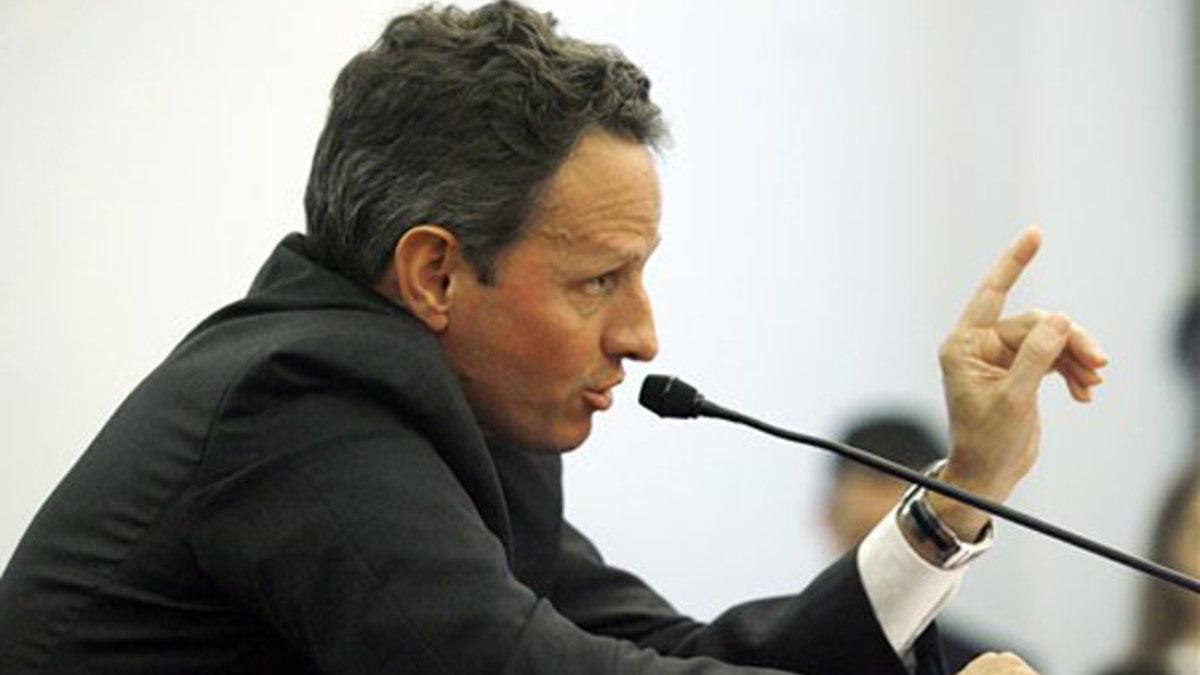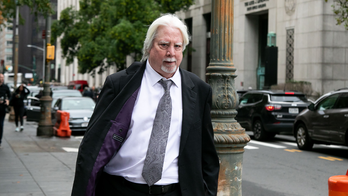
FILE: Treasury Secretary Timothy Geithner testifies on Capitol Hill on Nov. 19 to the Joint Economic Committee hearing on financial regulatory reform. (AP)
WASHINGTON -- A GOP lawmaker, in a tense exchange Thursday with Treasury Secretary Timothy Geithner, called on Geithner to resign immediately, blaming him for rising unemployment, growing federal deficits and accounting flaws in the number of stimulus jobs created, among other economic problems.
The request, made at a Joint Economic Committee hearing, sparked an intense and remarkable back-and-forth between Rep. Kevin Brady, R-Texas, and Geithner, who countered that the economy was in significantly better shape today than it was a year ago when Republicans controlled the White House, a view that was supported by a number of Democrats on the committee.
"Mr. Secretary, the public has lost all confidence in your ability to do your job," Brady said, adding that there is a "growing liberal consensus" that Geithner should be removed.
"Conservatives agree. Liberal Democrats agree that it really is time for a fresh start," he said. "We need a new economic team."
It's not the first time Geithner has faced calls for his resignation. Earlier this year Reps. Connie Mack, R-Fla. and Darrell Issa, R-Calif., urged him to step down.
But Geithner, who headed up the New York Federal Reserve Bank before being tapped by Obama to be Treasury secretary, held his ground Thursday.
"I agree with almost nothing in what you said," Geithner told Brady. "And I think almost nothing of what you said represents a fair and accurate perception of where this economy is today."
Geithner forcefully defended himself and the Obama administration and pinned blame for the country's economic woes on the previous administration.
The economy fell into the worst crisis in generations after "almost a decade -- certainly, eight years -- of basic neglect of basic public goods, in health care, in education, in public infrastructure, in how we use energy," he said.
"Tell all of that to the millions of Americans who no longer have jobs because of your decisions," Brady shot back.
"They would have had more jobs, there would have been more confidence, more employment in this country, if we had not let this crisis get to the point that it did," Geithner said. "And we would have had a stronger fiscal position if we had had eight years of paying for our commitments, not borrowing against them."
Hours after the exchange, the White House voiced support for Geithner, saying he helped steer the economy back from the brink.
But Democratic Sen. Charles Schumer of New York did criticize Geithner for not pressing China forcefully enough to allow its currency to rise in value against the dollar. American manufacturers blame a significant portion of the U.S. trade deficit with China on an undervalued yuan, which makes American products more expensive in China and Chinese goods cheaper in America.
"Today millions of Americans are out of work because the Chinese are manipulating their currency," Schumer said at the hearing, urging the administration to impose trade sanctions on Chinese products if the Chinese government did not stop controlling the value of the yuan.
Geithner said the Chinese government has indicated that it plans to allow its currency to be set by market forces and he predicted that it would not be long before China resumes allowing the yuan to rise in value.
Geithner was on Capitol Hill pushing Congress to move quickly in overhauling the nation's badly flawed financial rules, which he says is essential for the health of the economy.
"To ensure the vitality, the strength and the stability of our economy going forward, we must bring our system of financial regulation into the 21st century," Geithner testified.
But Geithner was pressed to disclose the administration's plan for winding down the unpopular $700 billion financial bailout program, known as the Troubled Assets Relief Program, or TARP. He said the government will end the rescue program "as soon as we can."
Geithner said "substantial resources" remaining in the fund would be used to pay down the national debt, which is being pushed higher by record deficits including a $1.42 billion imbalance for the budget year that ended Sept. 30. Even hundreds of billions of dollars would be a tiny fraction of the $12 trillion debt, but it could lessen political unhappiness if portions of the bailout program are allowed to continue.
While pledging to end TARP as quickly as possible, Geithner also said the administration did not want to repeat the mistake of other countries by ending government support too fast and derailing a fledgling economic recovery.
The House Financial Services Committee and the Senate Banking Committee are working on their own versions of sweeping financial overhaul plans, but the two panels are taking divergent approaches in some areas.
Both proposals also face sharp opposition from major sectors in the financial industry, casting doubt on how quickly Congress will be able to reach agreement and send a finished bill to the White House.
Geithner said the administration wants to ensure that firms won't be able to escape or avoid oversight by shopping for the most lenient regulator, a situation critics say contributed to the worst financial market crisis in seven decades.
"The fact that investment banks like Bear Stearns or Lehman Brothers or other large firms like AIG could escape meaningful consolidated federal supervision simply by virtue of their legal form should be considered unthinkable from now on," Geithner said.
The administration also wants to see Congress work to ensure that the financial system as a whole is more capable of absorbing shocks and coping with failures. That will require putting a greater focus on the quality of capital that firms are allowed to hold, Geithner said.
Capital reserves are the cushion financial firms carry to absorb loses.
The Associated Press contributed to this report.




